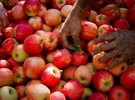Labour availability is a priority for apple and pear growers nationally, with negotiations to allow Pacific Islands workers entry to the country a key focus of both national and state bodies.
A poll conducted last week by APAL found that 53 per cent of growers are ‘not confident’ of their chances of accessing the labour they require come harvest*.
 APAL has been working with the Federal Government to achieve improved access to labour, but understands any national response must take into consideration the differing needs of each state.
APAL has been working with the Federal Government to achieve improved access to labour, but understands any national response must take into consideration the differing needs of each state.
State by state industry is working to keep hold of workers who may already be in the region and maintain access to backpackers and Pacific Islands workers.
This week we share updates from southern states (Queensland, Western Australia and NSW updates will be shared in next week’s Industry Juice).
Victoria
In the state hit hardest by the crisis, industry bodies like Fruit Growers Victoria (FGV) have been encouraging growers to redeploy seasonal workers where possible after work has finished on a farm.
There has also been backlash at calls to scrap the Working Holiday Visa used by backpackers who provide a vital labour pool during busy periods.
FGV Industry Development Officer Michael Crisera said both the Working Holiday Maker and Seasonal Workers (SWP) programs were critical.
“The Goulburn Valley is fortunate to have a strong local labour force with permanent migrants,” he said at a recent Senate inquiry.
“Our growers look after backpackers and work closely with them — we see the program as vital,” he said.
Victorian grower Peter Hall, of Integrity Fruits, in Ardmona, echoed these sentiments and called for the program to be streamlined to meet the needs of COVID-19 related shortages.
“No-one can be reliant on one source totally because you can’t be,” Peter said
“What the Government needs to do, you need a system where you can get workers from Vanuatu, Fiji, the Pacific Islands, bring them in, make sure they haven’t got the virus, and then send them to appropriate states.
“An exemption from international flight rule restrictions might be required.
“I would think that’s the best way to solve it because we aren’t going to get tourists in.”
South Australia
Apple and Pear Growers of South Australia CEO Susie Green says that while everyone would love to be employing Australians to pick fruit, the issue isn’t that simple.
“Certainly, there is a level of concern among our growers about what’s likely to come,” she said.
“The difference for us, compared to other states, is that we do get a significant number of workers come up from Adelaide, as our region isn’t too far away from a metropolitan area.
“The big unknown is the lack of backpackers and the flow-on effects from that.
“Everyone would love to be employing Australians.
“There’s no one silver bullet, we’re going to have to look at a number of solutions.”
Tasmania
Minister for Primary Industries and Water Guy Barnett today announced a new $1.9 million Agricultural Workforce Resilience Package over two years to assist with mobilising Tasmanians to help with the upcoming planting, production and harvest seasons.
The package features a local agricultural jobs campaign designed to encourage Tasmanians who are struggling to find employment to consider a new career option, and a boost to Safe Farming Tasmania to ensure new agricultural employees are workforce–ready.
The news came after months of working with peak state body Fruit Grower Tasmania (FGT) in assessing the needs of growers.
“We’ve been working closely with Government over the last few months, talking to the sector, so we certainly think we’ve got a feel for the scale of the issue,” said Michael Tarbath, Policy & Engagement Officer at FGT.
“The main two pillars are mobilising Tasmanian residents to work, and streamlining travel to Tasmania for work in the sector.”
More information on specific details from the package will be made available shortly, however you can find Minister Barnett’s release here.
Source: Apple and Pear Australia Ltd
